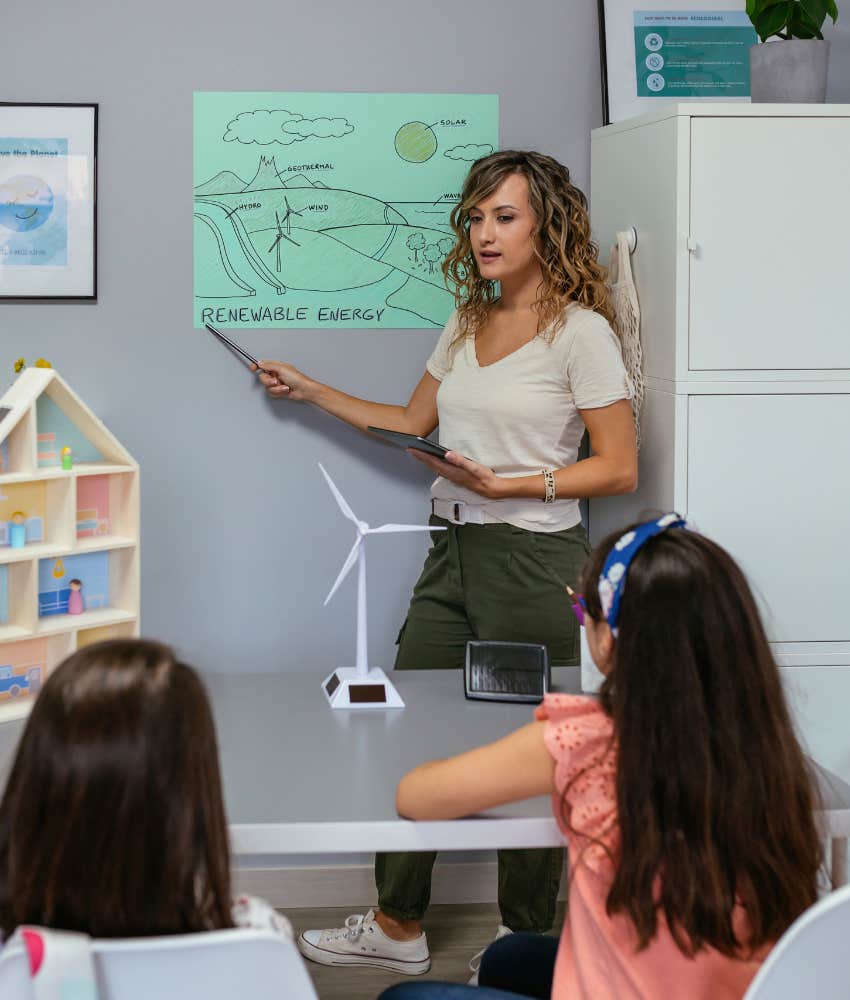Teacher Says Kids Are 'Vacant' In Class Without Their Phones — ‘They Behave Like Addicts’
She expressed concern that phone addiction is impacting education.
 MAYA LAB | Shutterstock
MAYA LAB | Shutterstock A teacher pulled back the curtain on what it's like trying to educate a classroom full of kids who are addicted to their phones and have access to excessive screen time. In a video shared to Instagram, the public school teacher echoed a sentiment that has been said by many other teachers across the country: smartphones and the advancement of technology are doing way more harm than good for young kids, especially when it comes to their being able to properly learn and retain information.
The fact remains, however, that phones and technology aren't going anywhere. That means everyone, from experts and parents to educators, needs to find common ground when it comes to how to incorporate technology into daily life without suffering the negative effects often associated with endless scrolling. That's not easy to do when adults are just as bad as kids when it comes to being attached to their phones.
A teacher said that kids are 'vacant' in class without their phones.
"I think you guys don't know what's going on in education right now," she began in the video. "How could you know unless you were working in it, but I think you need to know. So, here is exactly what it's like right now working in public education."
 David Pereiras | Shutterstock
David Pereiras | Shutterstock
She explained that kids have zero ability to be completely bored, and pretty much rely on their phones for all mental stimulation. They're just being fed this constant stream of dopamine from the second they wake up in the morning to the moment they close their eyes at night.
Kids don't know how to be bored or without the instant gratification that comes from their phones.
The point the teacher was ultimately trying to make is that since kids are getting constant dopamine hits from using their phones, being at school without them means they struggle to pay attention. They don't know how to be patient. They don't understand delayed gratification. They don't know how to be bored.
"They behave like addicts. They're super emotional," she observed. "The smallest things set them off, and when you are standing in front of them trying to teach, they're vacant. They have no ability to tune in. If your communication isn't packaged in short little clips or if it doesn't have bright flashing lights, it's actually way harder for me than outright behaviors."
She claimed that there's nothing worse than being at the front of the classroom trying to teach a bunch of kids who visibly look like they're not retaining any of the information being told to them. On top of that, she's noticed that her students don't seem to fear consequences and have a concerning amount of apathy for many things, including learning and progressing further in school.
Support for cellphone bans at school has risen exponentially.
 Andrii Iemelianenko | Shutterstock
Andrii Iemelianenko | Shutterstock
Many schools across the country are trying to find ways to make sure their students are engaged, and some of those measures include complete cellphone bans once they enter the building. According to a survey from the Pew Research Center, 74% of U.S. adults say they would support banning middle and high school students from using cellphones during class.
However, this teacher has pointed out that it's not the use in school that's worrisome. Kids are spending so much time on screens outside of school that it's impacting their ability to learn. Compared to ten years ago, kids nowadays have access to everything from games and ChatGPT to the ever-present social media. The uptick in the consumption of short-form videos has left many kids and even adults struggling with their attention spans.
A 2025 study found that smartphones before age 13 can really damage a child's mental health. Smartphone use by children younger than 13 was associated with suicidal thoughts, underdeveloped emotional regulation, lower self-worth, and even detachment from reality, especially among girls.
While it might seem like parents don't need to step in, children having access to the internet in the way that they do is damaging their brains in ways that are quite concerning. Basic childhood milestones and developmental milestones are being lost because real-world skills are going unused.
Nia Tipton is a staff writer with a bachelor's degree in creative writing and journalism who covers news and lifestyle topics that focus on psychology, relationships, and the human experience.

